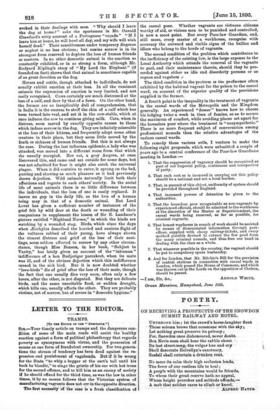LETTER TO THE EDITOR.
TRAMPS.
[To TEl EDITOR 01 TEL " SrscrATos.—] SIE,—Your timely article on tramps and the dangerous con- dition of some of the main roads will assist the healthy reaction against a form of political philanthropy that regards poverty as synonymous with virtue, and the possession of means as one form of fraudulent ownership. For two genera- tions the stream of tendency has been dead against the re- pression and punishment of vagabonds. But if it be wrong for the State "to whip a beggar at the cart's tail until his back be bloodie," to singe the gristle of his ear with hot irons for the second offence, and to kill him as an enemy of society if he should offend for the third time, as was the law in other times, it by no means follows that the Victorian system of manufacturing vagrants does not err in the opposite direction.
The first necessity of the case is a fresh classification of the casual poor. Whether vagrants are virtuous- citizens
worthy of aid, or vicious men to be punished and controlled, is now a moot point. But every Poor-law Guardian, and, still more, every master of a workhouse, recognise with,
accuracy the outward and visible signs of the bullies and idlers who belong to the horde of vagrants.
The second condition of the problem which contributes to the inefficiency of the existing law, is the large expense to the Local Authority which attends the removal of the vagrants to gaol, and their maintenance therein, should they be pro- ceeded against either as idle and disorderly persons or as- rogues and vagaboni r The third condition in the problem is the preference often.
exhibited by the habitual vagrant for the prison to the casual ward, on account of the superior quality of the provisions supplied in the former.
A fourth point is the inequality in the treatment of vagrants in the casual wards of the Metropolis and the Kingdom generally. An experienced "dosser" knows how to choose his lodging twice a week in time of famine, so as to secure the maximum of comfort, while avoiding places set apart for the houseless poor where the treatment is "unsympathetic?' There is no more frequent subject of conversation among professional nomads than the relative advantages of the various casual wards.
To remedy these various evils, I venture to make the following eight proposals, which were submitted a couple of years ago to a central conference of the Poor-law Guardians- meeting in London :- 1. That the suppression of vagrancy should be recognised as part of our Imperial policy, continuous and irrespective of party.
2. That such cost as is incurred in carrying out this policy should be a national and not a local burden.
3. That, in pursuit of this object, uniformity of system should be provided throughout England.
4. That increased powers of detention be given to the authorities.
5. That the houseless poor recognisable as non-vagrants by experienced officials, should be admitted to the workhouse at the discretion of the Master or Superintendent, the casual wards being reserved, as far as possible, for criminal vagrants.
6. That honest wayfarers in search of work should be assisted by means of disseminated information through post- offices, supplied with cheap railway-tickets, and every method possible devised to extract the few good from the many criminal nomads, and thus free our hand in dealing with the class as a whole.
7. That wherever possible in the country, the vagrant should; be put to compulsory spade husbandry.
8. And for London, that Mr. Ritchie's Bill for the provision of central stations in connection with casual wards in London, which passed the House of Commons, and which was thrown out in the Lords on the opposition of Chelsea, should be passed.
Oman Mansions, Hampstead, June 10th.


































 Previous page
Previous page